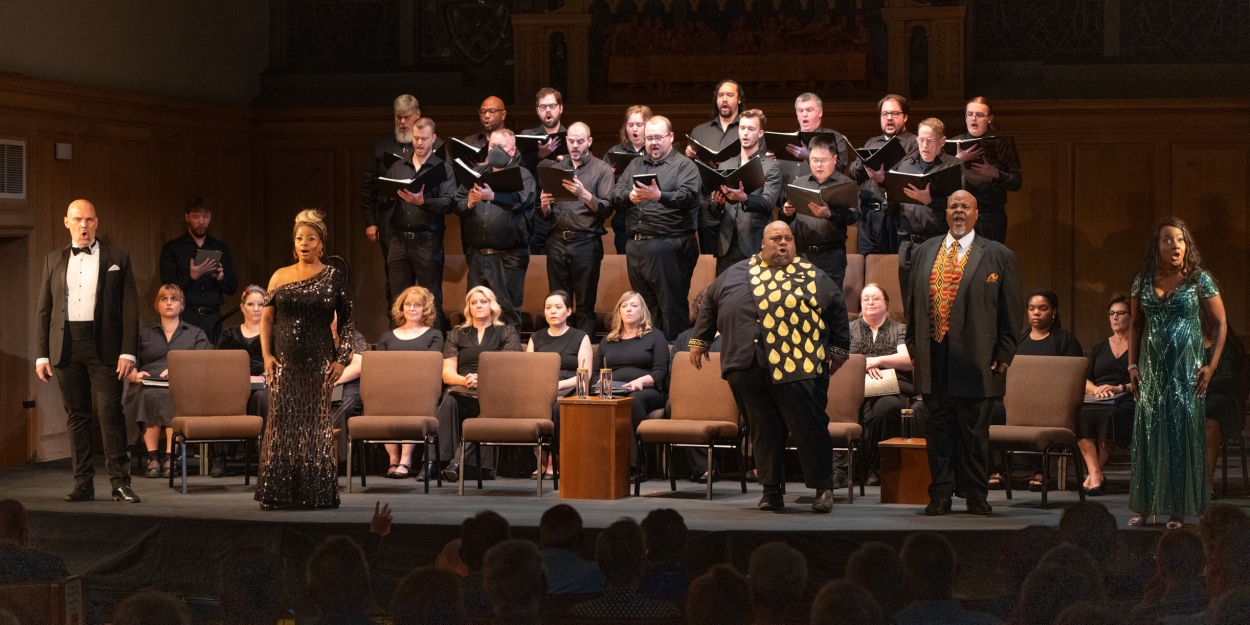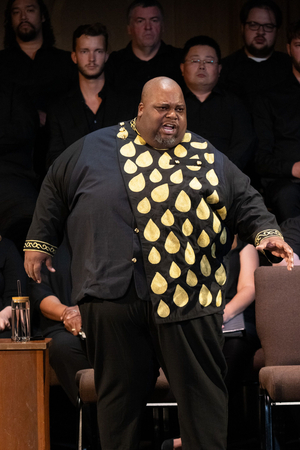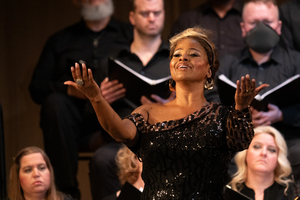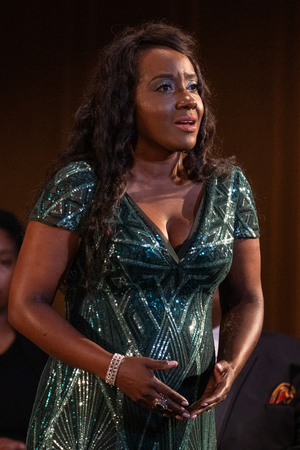Review: AIDA at Union Avenue Opera
Verdi's "Aida" thrills at Union Avenue Opera

The small but remarkably fine Union Avenue Opera Company continues its thirtieth season with a production of Giuseppe Verdi’s Aïda (“in concert”).
This opera was commissioned by the Khedive of Egypt to celebrate the opening of the Suez Canal in 1871. It was written on a supremely large scale—large voices, large chorus, colossal scenery, and music that pushed the very limits of grandiosity.
Armies marched across the stage, there were horses, chariots. Time was when any respectable production would have an elephant or two. A production in China had a cast of 2,200! It’s not surprising that, though the music is utterly glorious, Aïda is among the less-frequently produced of Verdi’s works.
So—what was tiny little Union Avenue Opera to do with this behemoth? God bless them, they focused on the music and the voices. They let us imagine the visual splendor. The stage is almost filled with risers and the largest chorus the company has ever gathered. The principals sing in the downstage area—close to the orchestra and close to us.
The story takes place some two-and-a-half millennia ago in the Egypt of the early pharaohs. So old is the romantic triangle! So eternal is the drama of love across tribal hatreds. Egypt and Ethiopia are at war. Aïda, the captured princess of Ethiopia, is now a slave to Amneris, the princess of Egypt. Both women love Radamès, the Captain of the Egyptian Guard. He loves Aïda. He leads his army to triumph over the Ethiopians. Among his captives is Amonasro. Little does Radamès know that Amonasro is the King of Ethiopia—and Aïda’s father.
Poor Aïda—torn between love for Radamès and love for her country and for her own father! And that bitter Amneris! She knows that Aïda is her romantic enemy.
This is an opera so filled with truly glorious moments. And Artistic Director Scott Schoonover has gathered a cast well up to the task of attaining that glory.

Standing mightily at the center of this strong cast is the remarkable dramatic tenor Limmie Pulliam, as Radamès. Two years ago Pulliam stepped into this role at The Met. He has recently had his debut at Carnegie Hall. He has, I think, the most gorgeously powerful voice I’ve ever heard. He opens his mouth and out pours this ocean of song—filled with real passion that intensifies as the melody climbs higher. His is a quite unforgettable voice. The very rafters tremble.
Pulliam comes from the tiny town of Kennett in Missouri’s boot-heel. A preacher’s son, he had no musical training other than with his church’s gospel choir and his high-school chorus. Limmie was a bit of a class clown, and he had the knack of vocal impersonation. He could do a terrific Stevie Wonder. He’d never heard opera until his chorus teacher gave him a cassette with arias on it. It turned out he could do a pretty darned good impersonation of that guy, too—it was Luciano Pavarotti.

Mr. Pulliam has a fascinating biography. Look him up.
The role of Aïda is brilliantly sung by Marsha Thompson. Her voice slips up through the massed chorus like a gleaming spire, and she has the most beautifully controlled vibrato.

Princess Amneris is sung by a beloved St. Louis favorite, Melody Wilson. This lady has sung opera all over the country, but she returns to Union Avenue year after year. And she just keeps getting better. Her mezzo voice is warm and dramatic and she’s a deeply believable actress.
Bass-baritone Lloyd Reshard brings a powerful soft-edged voice to the role of Amonasro, the Ethiopian king. In his anger he is a commanding presence on the stage.
Jacob Lassetter and Todd Payne fill (respectively) the High Priest and the King of Egypt with appropriate power and dignity. Danielle Yilmaz makes a striking High Priestess, and R. Nathan Brown brings news from the battlefield with lovely clarity and force.
Throughout the evening there is masterful work done by the chorus. It’ll overwhelm you.
Scott Schoonover conducts the excellent orchestra. The score has a number of “cameo” passages for solo instruments, each of which shines with real virtuosity.
I love Aïda! I love its bold, unashamed grandiosity. I’ve known it a long while. I first encountered it some seventy years ago when I marched with my high-school band trying to play the triple-forte passages of the Grand March on my Sousaphone into the teeth of a thirty-mile-an-hour Kansas west wind. Later, in grad school in England, I had the luck to play a spear-carrying soldier for one performance when the Covent Garden Opera came to Leeds. No rehearsal; we just marched and marched and marched. At intermission I was chosen to come in and arrest the tenor in the third act. (I got paid ten shillings.)
Neither of those experiences were as thrilling as Union Avenue’s production of Aïda. That is very, very, very thrilling indeed. It continues through August 3.
Reader Reviews

Videos

